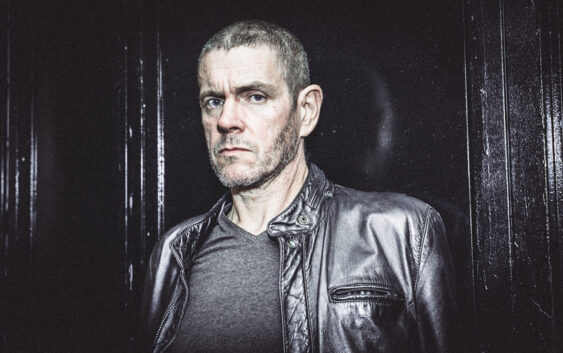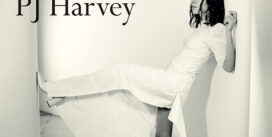Chris Connelly has just released his 23rd solo album entitled Graveyard Sex. After last year’s experimental Sleeping Partner, Graveyard Sex marks the return to his trademark sound. The album is emotionally fuelled, rich with dreamy soundscapes and most expressive vocals; it’s an intense and awe-inspiring masterpiece that could easily be his most profound piece of work so far. We took this opportunity to talk to Chris about his latest record and recent musical endeavours.
1. Hello Chris! First, I want to thank you for decades of outstanding music. Last time we talked, you had just released Bloodhounds. Looking back, and two albums apart, how do you feel about that record today?
Chris: Hi Marija, I am very proud of Bloodhounds, I think especially because it is so long and I don’t think it repeats itself. I like the dynamics of it, the highs and the lows and I like where the lyrics take you; they are like landscapes to me, exploring a city, meeting these strange characters. Having sad that, I have not listened to it since it came out, but that is the same for all my records. When they are done, for me, they are done and I file them away.
2. Sleeping Partner made a shift to experimental music expression. It’s loosely based on The Cement Garden, a novel by Ian McEwan. Why that novel in particular? How did the subject shape the sound, if at all?
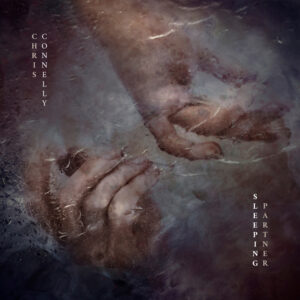 Chris: I have been a lifelong Ian McEwan reader, and I loved the Andrew Birkin film version of the book. I think I used it because the album, sort of, takes place all in one location in my mind, and the book as well takes place in one house, that is the character’s world, and in that world, it is a real situation where nothing at all is “normal”. Same goes for Sleeping Partner. But I was also interested in the fact that in novels, you can get away with some very taboo subjects; Ian McEwan writes openly about incest between a brother and sister, and he writes about it beautifully, and then a film got made of it. I sometimes feel like you cannot get away with that stuff on record. Well, you can, but you are not going to get the sort of praise afforded to an author. McEwan is up there, one of the most highly respected authors in the world. So, yes, a song like “Obsession Stares Back” is dealing with the main characters in the book, Jack and Julie, and their relationship. It’s not supposed to be overtly salacious or exploitative, but in the book it is a main focus in an extremely dysfunctional universe, the microcosm of the family unit within the walls; no parents, just children, inventing and recreating their lives before the parent’s died, which was dysfunctional also. And yet, McEwans exquisite writing and Birkin’s beautiful film making turn this hell-on-earth scenario into beauty. You could say the same for Tim Roth’s excellent film The War Zone. The subject matter is ugly and terrifying, and yet presented and a work of art.
Chris: I have been a lifelong Ian McEwan reader, and I loved the Andrew Birkin film version of the book. I think I used it because the album, sort of, takes place all in one location in my mind, and the book as well takes place in one house, that is the character’s world, and in that world, it is a real situation where nothing at all is “normal”. Same goes for Sleeping Partner. But I was also interested in the fact that in novels, you can get away with some very taboo subjects; Ian McEwan writes openly about incest between a brother and sister, and he writes about it beautifully, and then a film got made of it. I sometimes feel like you cannot get away with that stuff on record. Well, you can, but you are not going to get the sort of praise afforded to an author. McEwan is up there, one of the most highly respected authors in the world. So, yes, a song like “Obsession Stares Back” is dealing with the main characters in the book, Jack and Julie, and their relationship. It’s not supposed to be overtly salacious or exploitative, but in the book it is a main focus in an extremely dysfunctional universe, the microcosm of the family unit within the walls; no parents, just children, inventing and recreating their lives before the parent’s died, which was dysfunctional also. And yet, McEwans exquisite writing and Birkin’s beautiful film making turn this hell-on-earth scenario into beauty. You could say the same for Tim Roth’s excellent film The War Zone. The subject matter is ugly and terrifying, and yet presented and a work of art.
I am not saying Sleeping Partner is ugly, far from it, but I was interested in taking some real dynamics of relationships and bringing them to life in their own special environment. I see that album as walking through a dark abandoned house filled with strange objects, a sort of playground cut off from the world where things could happen.
3. Fast forward one year and we have Graveyard Sex. It’s probably your heaviest and darkest record, it’s so emotion-charged. Where were your thoughts at the time of writing it?
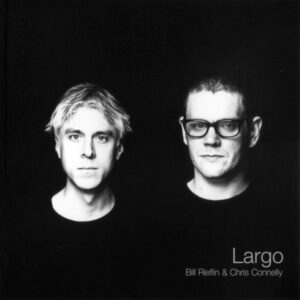 Chris: My friend Bill Rieflin and I had been talking about writing together. He was very ill, and we planned to get together in Seattle and work on music. I had started to come up with some loose sketches for songs, with the intention of taking them to him to work on, but his health failed him, he could not do it, but I kept writing. Many of the songs allude to Bill, our relationship, and his musicianship; he was such a mentor to me. It also discusses the idea of the artist who cannot work any more; Bill could no longer create, but he kept trying. Bill died before he could get to hear it. I can’t listen to it, I think it’s a beautiful record but it is forever entangled with the sorrow of losing him.
Chris: My friend Bill Rieflin and I had been talking about writing together. He was very ill, and we planned to get together in Seattle and work on music. I had started to come up with some loose sketches for songs, with the intention of taking them to him to work on, but his health failed him, he could not do it, but I kept writing. Many of the songs allude to Bill, our relationship, and his musicianship; he was such a mentor to me. It also discusses the idea of the artist who cannot work any more; Bill could no longer create, but he kept trying. Bill died before he could get to hear it. I can’t listen to it, I think it’s a beautiful record but it is forever entangled with the sorrow of losing him.
4. What exactly does Graveyard Sex mean to you? How did you come up with the title?
Chris: At first, in my mind, I was talking to Bill, as I often do. I have conversations and I hear his voice, and I suggested that the most goth album title ever would be “Graveyard Sex”. I know he would have laughed at that, but then I realized that the two words are indicative of DEATH (GRAVEYARD) and LIFE (SEX) and I liked the irony, which you can also see in the album cover. And third, it was a gender SEX: GRAVEYARD, for someone who has been robbed of their vitality.
5. There are many references to your friend and music partner Bill Rieflin on the album. “Lindsay Cooper” is one of them. Can you tell us a little bit more about the reason you spoke about her?
Chris: Lindsay Cooper played bassoon in the band Henry Cow, the first band I ever saw play in concert in 1978. I loved her playing, it was beautiful, but she developed multiple sclerosis, and was robbed of the thing she loved the most, her music, and eventually, it killed her. Bill also could no longer play, and believe me, I am sure you know, Bill is the best musician I have ever played with, so that was heartbreaking to witness.
6. Why did you choose “Hypnotic Stand-By” as the leading single?
Chris: I asked my business partner Kimberly what she would choose, and I am glad she did! She made a beautiful video for it as well.
7. For me, the most gut-wrenching moment on the album was the cover of Nico’s “You Forget To Answer”. What does her song mean to you, and what does the cover mean to you?
Chris: Another one for Bill! Bill made me a mixtape when I first moved to The States, that song was on it, and I had never heard it. It is spellbinding. I wanted to record it for Bill, and he heard it. Nico has a very special place in my heart, as I have mentioned before in interviews; she used to live in Edinburgh, on St Stephen’s place, one of my favorite streets in the world. Myself and my friends would go down to see if she would come out, she never did, but I did meet her twice after concerts in Edinburgh. I was so young, 15.
8. Graveyard Sex is rich with references to the music that you and Bill liked. Can you tell us more about the music that inspired the album, as well as your work in general? Who were the artists that impressed you and Bill the most?
Chris: I would say John Cale, Robert Wyatt, Nico, Roxy Music and Scott Walker. The sleeve of the album is an homage to Bill’s favourite Roxy album Country Life, and I mention Robert Wyatt in “The Hypnotic Standby”. But there are also a lot of just instrumental references that he would get, like in the song “Mesmerido”, I play a trumpet solo that references John Cale’s “Helen of Troy”, I hope in a subtle way!
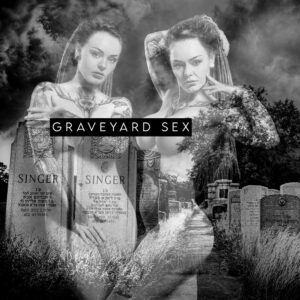 9. The album cover is inspired by Roxy Music’s County Life. How did you come up with that idea?
9. The album cover is inspired by Roxy Music’s County Life. How did you come up with that idea?
Chris: I worked very closely with the photographer Derick Smith, who did Bloodhounds. It sort of evolved organically; I let him hear the album, and he came up with some beautiful ideas that were really quite literal. At first, it was one body. The problem was we could not have two bodies because we were in lockdown and doing anything was hard, but we knew we wanted to go for a stylized Roxy Music approach. I asked him to use two of the shots together, this was after I had been listening to Country Life, and I knew how much Bill would have loved it, and Derick and Courtney (the model) brought the whole thing to life… As a sick joke I almost wanted to change the title to “Country Death”.
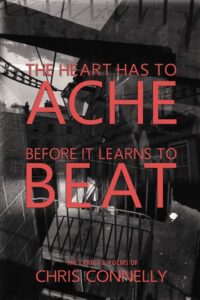 10. The Heart Has To Ache Before It Starts To Beat is the title of your recently published collection of poems and lyrics. Now we find it on the album. Can you tell us a bit about the book? How did you decide to compile 40 years of lyrics and poems and publish them as a book?
10. The Heart Has To Ache Before It Starts To Beat is the title of your recently published collection of poems and lyrics. Now we find it on the album. Can you tell us a bit about the book? How did you decide to compile 40 years of lyrics and poems and publish them as a book?
Chris: I had been working at such a pace, and I am really, really shit at keeping notes. When I finish writing a song, it goes in an unmarked school exercise book, in no order, along with grocery lists, notes, diagrams, who knows?! Then when the song is about to be recorded, I try and find it, and stuff it with the other songs for the album in a plastic grocery bag on my studio door handle. So the book was me trying to make sure I have it all documented and available. It was a real pain in the ass (I am sure) for Kimberly, she knows my material better than me. And then I found I could not proof read it, I am terrible at that too, so I asked my friend Megan to do that. I still have the stupid notebooks and grocery bags stuffed with chord charts and lyrics, all hand written badly…
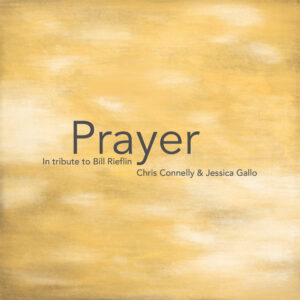 11. In celebration of Bill’s birthday, on 30th September you released a single “Prayer” together with renowned harpist Jessica Gallo. Can you tell us a little bit about the collaboration and the idea behind it?
11. In celebration of Bill’s birthday, on 30th September you released a single “Prayer” together with renowned harpist Jessica Gallo. Can you tell us a little bit about the collaboration and the idea behind it?
Chris: I met Jessica after Bill’s passing, and we have become very close friends; she helped me through a dark time, she was close to Bill as well, and they played music together. We talked very deeply about spirituality, and she told me she had been learning this song, which is from Bill and I’s 1999 album Largo. At the time, I did not write lyrics for it, it was just Bill playing piano, but I suggested to Jessica we do it for his birthday and try and generate money for the clinic that treated Bill. It’s all about making something beautiful out of a darkness, finding that light.
12. Between Bloodhounds and Graveyard Sex, you worked on other projects. You collaborated with the legendary producer John Fryer on one single and became a member of the industrial music supergroup The Joy Thieves. How did those collaborations come about?
Chris: Well you introduced me to John, thank you, I love his music. The best collaborations are when the music pushes you somewhere, same goes for The Joy Thieves. I love the violence and the integrity and the power of that music, it has been very visceral in a time where that emotion is needed in art and culture.
13. You’ve teamed with guitarist Mark Gemini Thwaite for a re-work of the 1974 soul classic “How Long”, originally performed by Ace. How do you feel about the collaboration and the outcome?
Chris: I am so into it! When he told me, I got really excited. I love that song, and I also love working with Mark, amazing musician.
14. You will also appear, alongside 20+ bands, on Tear Down The Walls, a tribute to Pink Floyd’s The Wall. Can you tell us more about the project? Are you allowed to tell us which song you’ve recorded with The Joy Thieves for the project?
Chris: “One Of My Turns”, no one said I wasn’t allowed!!!
15. You are often inspired by other forms of art, e.g. visual art, literature… How do you translate one form of art to another? Can you describe how that process looks to you?
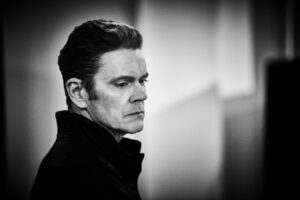 Chris: I do not see it as translation so much as what that thing awakens in you. If you look at a painting, for example, you have to let yourself be open; I think that is the way you can feel the other artist’s spirit, and yours is awoken. When I look at some conceptual art, I can get very energized because you can almost feel the artist’s brain intuitively moving with the concept. I feel it with film and books too, I felt it when I saw your photography, it makes me want to move, do something new. I think it’s a good thing I get that from other forms of art, and of course, I get it from music, records and things, but I will get a bit more analytical, because I know how to make records; “Ah! That’s a great harmony”, or ”I love the fact that there is a string section here”, whereas, I don’t with paintings because I am not a painter, I can enjoy it without thinking about it too much and move on from there.
Chris: I do not see it as translation so much as what that thing awakens in you. If you look at a painting, for example, you have to let yourself be open; I think that is the way you can feel the other artist’s spirit, and yours is awoken. When I look at some conceptual art, I can get very energized because you can almost feel the artist’s brain intuitively moving with the concept. I feel it with film and books too, I felt it when I saw your photography, it makes me want to move, do something new. I think it’s a good thing I get that from other forms of art, and of course, I get it from music, records and things, but I will get a bit more analytical, because I know how to make records; “Ah! That’s a great harmony”, or ”I love the fact that there is a string section here”, whereas, I don’t with paintings because I am not a painter, I can enjoy it without thinking about it too much and move on from there.
16. In your opinion, what is the greatest reward for an artist?
Chris: The greatest reward for me has always been the moment of creation. Nothing before and nothing after comes close. The energy is often so blinding, I cannot remember how I did things, how I wore things, why I did it. I read something recently about “deep time”, a time that exists outwit our human construct of time, without a start or a measurement or a finish, and I think that’s where I write, and it is a privilege to be able to go there. It is not something that was always there, I feel like, without knowing it, I have worked toward it for years, and here we are.
promo pics by Jolene Siana and Derick Smith


